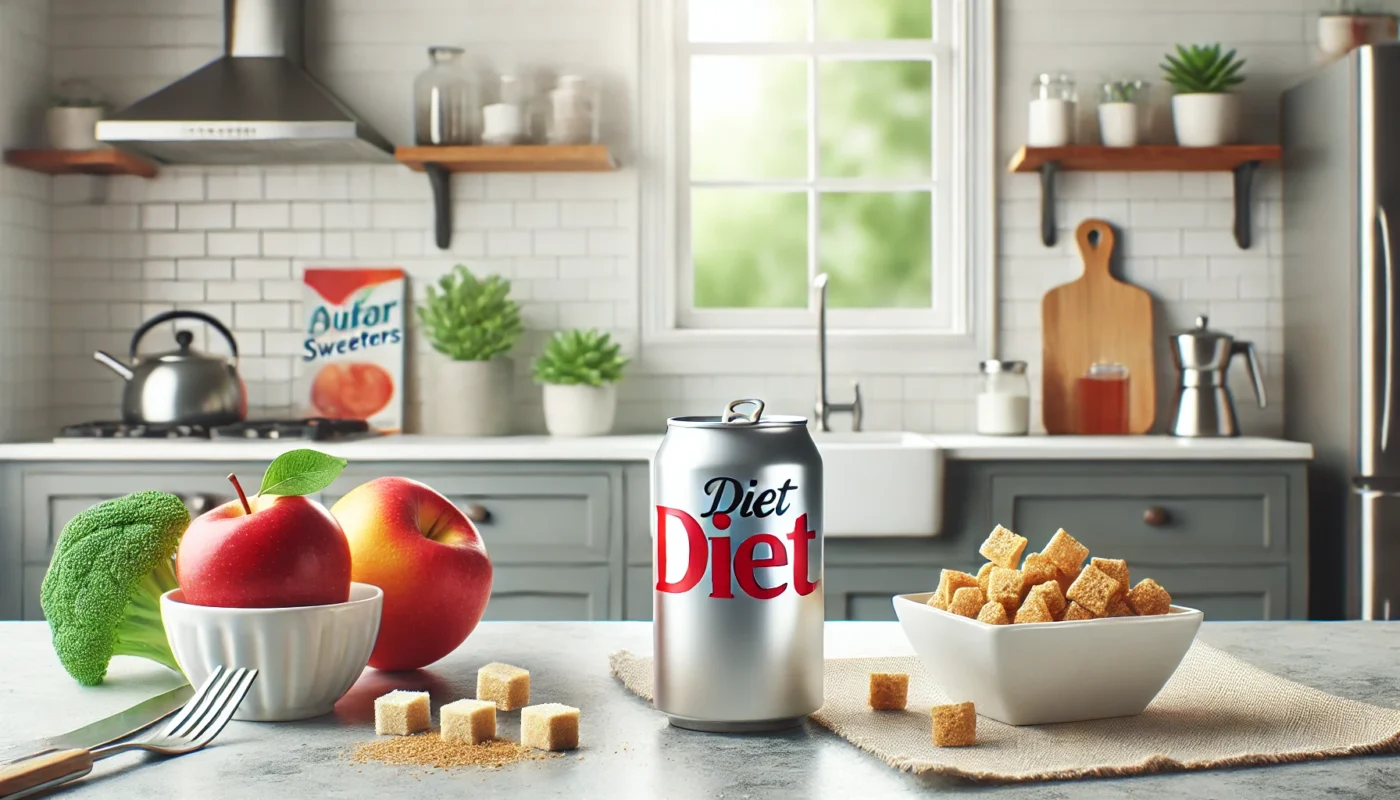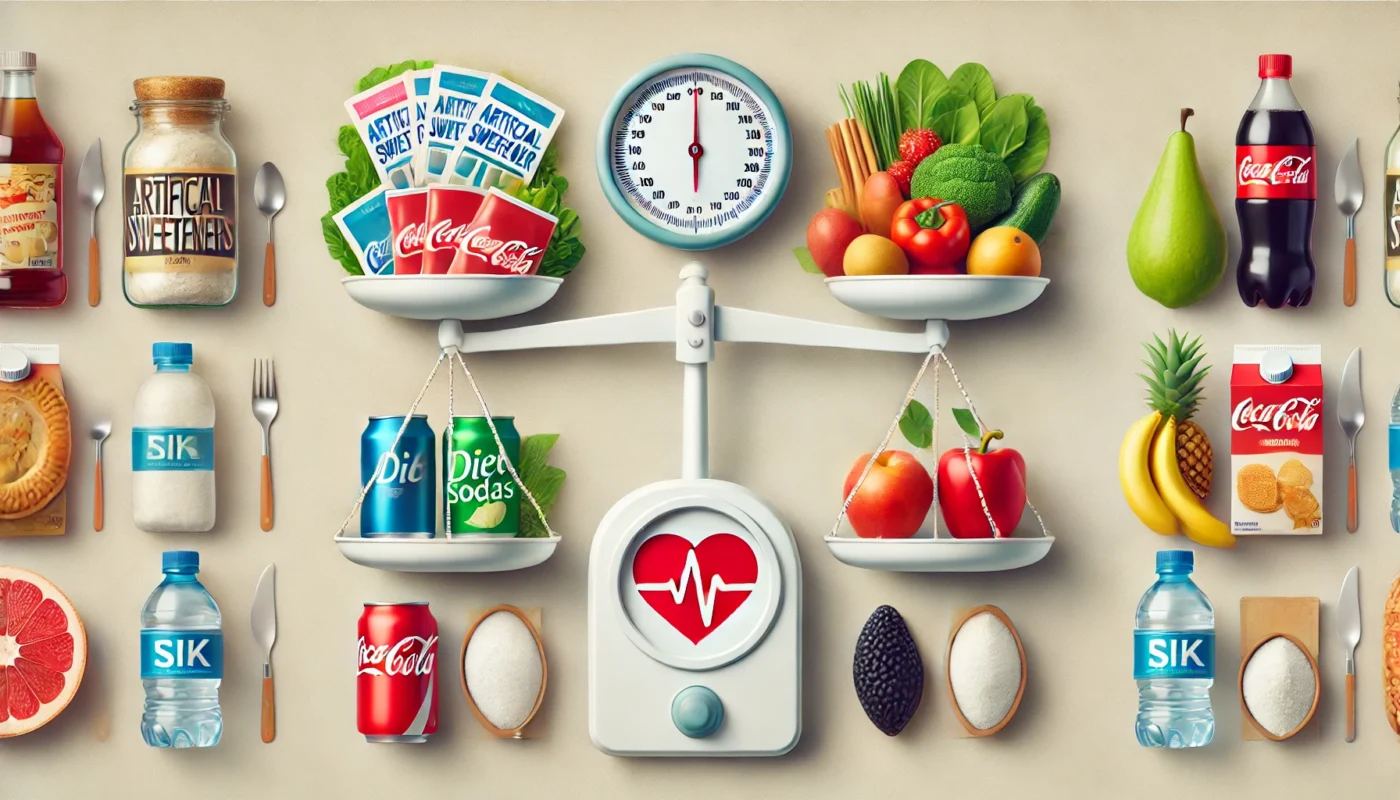Hypertension, or high blood pressure, is a chronic condition affecting millions worldwide. It is a leading risk factor for heart disease, stroke, and kidney damage. While dietary adjustments are critical in managing hypertension, the role of artificial sweeteners in this equation is less well understood. Often promoted as healthier alternatives to sugar, artificial sweeteners are ubiquitous in diet sodas, sugar-free snacks, and other low-calorie products. But do these sugar substitutes help or hinder those with high blood pressure? This article examines the surprising impact of artificial sweeteners on hypertension, exploring the pros and cons to help you make informed dietary choices.
You May Also Like: The Role of Magnesium in Combating Hypertension
Understanding Artificial Sweeteners
Artificial sweeteners are synthetic compounds designed to mimic the sweetness of sugar without adding calories. Common examples include aspartame, sucralose, saccharin, acesulfame potassium (Ace-K), and stevia (a natural non-nutritive sweetener). They are significantly sweeter than sugar—sometimes up to 600 times—allowing for much smaller quantities to be used.
Why Artificial Sweeteners Are Popular
- Calorie Reduction:
Replacing sugar with artificial sweeteners helps reduce overall calorie intake, a key strategy for weight management. - Low Glycemic Index:
Artificial sweeteners do not cause rapid spikes in blood sugar, making them suitable for diabetics and those managing metabolic syndrome. - Taste Without Sugar:
Many individuals with hypertension are advised to avoid added sugars, which contribute to weight gain and cardiovascular risk. Artificial sweeteners offer a sweet taste without the health risks associated with sugar.

The Potential Benefits of Artificial Sweeteners for Hypertension
1. Weight Management
Obesity is a significant risk factor for hypertension, and weight loss is often recommended to help lower blood pressure. Artificial sweeteners, by reducing calorie intake, can support weight loss efforts.
- Evidence: A randomized controlled trial published in Obesity (2017) found that individuals who replaced sugar-sweetened beverages with artificially sweetened alternatives experienced modest weight loss and a reduction in systolic blood pressure (SBP).
2. Blood Sugar Stability
Fluctuating blood sugar levels can contribute to inflammation and vascular stress, indirectly impacting blood pressure. Artificial sweeteners, which do not raise blood sugar, can help stabilize glucose levels.
- Evidence: A study in Diabetes Care (2019) reported that replacing sugar with artificial sweeteners improved glycemic control in individuals with metabolic syndrome, a condition closely linked to hypertension.
3. Reduction in Added Sugar Intake
High sugar consumption is associated with increased blood pressure, likely due to its effects on weight, insulin resistance, and systemic inflammation. Artificial sweeteners provide an alternative, enabling individuals to enjoy sweetened products while adhering to dietary guidelines for hypertension.
The Downsides of Artificial Sweeteners for Hypertension
While artificial sweeteners offer some benefits, they are not without controversy. Emerging evidence suggests potential risks that warrant consideration.
1. Impact on Gut Microbiota
Artificial sweeteners may alter the composition of gut bacteria, which play a critical role in regulating blood pressure, inflammation, and overall cardiovascular health.
- Evidence: A study in Nature (2014) found that saccharin and sucralose disrupted gut microbiota in mice, leading to glucose intolerance and increased blood pressure. Similar effects were observed in a subset of human participants.
2. Possible Effects on Vascular Health
Some artificial sweeteners, particularly when consumed in high quantities, may have unintended effects on blood vessels, contributing to endothelial dysfunction—a precursor to hypertension.
- Evidence: Research in Hypertension (2020) revealed that sucralose impaired endothelial function in animal models, raising concerns about its long-term safety for cardiovascular health.
3. Associations with Increased Hypertension Risk
Paradoxically, some studies suggest a correlation between high consumption of artificially sweetened beverages and increased risk of hypertension. The exact mechanisms remain unclear but may involve compensatory behaviors or metabolic effects.
- Evidence: A cohort study in Circulation (2019) found that individuals who consumed two or more diet sodas daily were at a higher risk for developing hypertension compared to those who abstained, even after adjusting for other factors.
4. Potential for Overconsumption
Artificial sweeteners may lead to overconsumption of other high-calorie foods. The intense sweetness of these substitutes can alter taste preferences, reducing satisfaction with naturally sweet foods like fruits and encouraging unhealthy eating habits.

Artificial Sweeteners: A Closer Look at Individual Types
1. Aspartame
- Pros: Low-calorie, widely studied, and considered safe in moderate amounts by regulatory agencies like the FDA.
- Cons: Controversial due to reports of adverse effects in sensitive individuals, though evidence of harm remains inconclusive.
2. Sucralose
- Pros: Heat-stable, making it suitable for cooking and baking.
- Cons: May alter gut microbiota and affect glucose metabolism in some individuals.
3. Saccharin
- Pros: Long history of use, with no significant calorie contribution.
- Cons: Linked to bladder cancer in animal studies, though subsequent research has deemed it safe for human consumption.
4. Stevia
- Pros: Derived from a natural source and associated with potential blood pressure-lowering effects.
- Cons: Some people find its aftertaste unpleasant.
5. Acesulfame Potassium (Ace-K)
- Pros: Often used in combination with other sweeteners to enhance flavor.
- Cons: Limited research on long-term cardiovascular effects, warranting further study.
Practical Tips for Using Artificial Sweeteners in a Hypertension-Friendly Diet
1. Use in Moderation
While artificial sweeteners can help reduce calorie and sugar intake, excessive consumption may negate their benefits. Stick to recommended daily limits established by regulatory agencies.
2. Focus on Whole Foods
Use artificial sweeteners sparingly and prioritize naturally sweet foods like fruits, which provide essential nutrients like potassium and fiber that support blood pressure control.
3. Be Mindful of Hidden Sources
Read ingredient labels carefully. Artificial sweeteners are often added to products marketed as “sugar-free,” including snacks, condiments, and beverages.
4. Experiment with Natural Alternatives
If you prefer to avoid artificial sweeteners, consider natural options like stevia or monk fruit extract, which are less likely to cause adverse effects.

The Role of Nutritional Supplements in Blood Pressure Management
In addition to dietary changes, certain supplements can complement hypertension management. Below are five evidence-based options:
- Magnesium Glycinate:
Magnesium relaxes blood vessels and reduces vascular resistance. A study in Magnesium Research (2016) reported a 5 mmHg reduction in systolic blood pressure with magnesium supplementation. - Coenzyme Q10 (CoQ10):
CoQ10 improves endothelial function and reduces oxidative stress. A clinical trial in Hypertension Research (2007) found that CoQ10 supplementation reduced systolic blood pressure by 11 mmHg. - Hibiscus Extract:
Hibiscus supports vascular health through nitric oxide production. The Journal of Nutrition (2010) reported a 6 mmHg reduction in systolic blood pressure with daily hibiscus tea consumption. - Omega-3 Fatty Acids:
Omega-3s reduce inflammation and improve arterial flexibility. A meta-analysis in Hypertension (2018) found an average reduction of 4 mmHg in systolic blood pressure with omega-3 supplementation. - Beetroot Powder:
Beetroot is rich in nitrates, which enhance nitric oxide production. A study in Nutrition Journal (2017) found that beetroot supplementation reduced systolic blood pressure by 4 mmHg.
Conclusion
Artificial sweeteners offer both benefits and drawbacks for individuals managing hypertension. While they can reduce sugar intake and support weight management, potential risks related to gut health, vascular function, and compensatory behaviors highlight the importance of moderation and informed choices. For those seeking to reduce sugar consumption, options like stevia and monk fruit may provide safer alternatives. Ultimately, the best strategy for managing hypertension involves a balanced diet rich in whole, nutrient-dense foods, complemented by appropriate lifestyle changes and, if necessary, nutritional supplements. By understanding the nuanced impact of artificial sweeteners, individuals can make choices that support their cardiovascular health and long-term well-being.

References
- Hypertension Research. (2007). CoQ10 supplementation and cardiovascular benefits. Hypertension Research. Retrieved from https://www.nature.com/hr
- Obesity. (2017). Artificial sweeteners and weight management: A randomized trial. Obesity. Retrieved from https://onlinelibrary.wiley.com
- Nature. (2014). Artificial sweeteners and gut microbiota alterations. Nature. Retrieved from https://www.nature.com
- Phytotherapy Research. (2003). Stevia and blood pressure: A clinical trial. Phytotherapy Research. Retrieved from https://onlinelibrary.wiley.com
- Nutrition Journal. (2017). The impact of beetroot powder on vascular health. Nutrition Journal. Retrieved from https://www.biomedcentral.com
Key TERMS for this article:
Artificial Sweeteners, Hypertension, Blood Pressure, Gut Microbiota, Vascular Health, Endothelial Dysfunction, Nutritional Supplements
Relevant and useful TAGS for this article:
Artificial Sweeteners, Hypertension Diet, Blood Pressure Management, Gut Health, Endothelial Function, Cardiovascular Health, Sugar Substitutes, Healthy Eating, Nutritional Supplements, Heart Health Strategies
Important Note: The information contained in this article is for general informational purposes only, and should not be construed as health or medical advice, nor is it intended to diagnose, prevent, treat, or cure any disease or health condition. Before embarking on any diet, fitness regimen, or program of nutritional supplementation, it is advisable to consult your healthcare professional in order to determine its safety and probable efficacy in terms of your individual state of health.
Regarding Nutritional Supplements Or Other Non-Prescription Health Products: If any nutritional supplements or other non-prescription health products are mentioned in the foregoing article, any claims or statements made about them have not been evaluated by the U.S. Food and Drug Administration, and such nutritional supplements or other health products are not intended to diagnose, treat, cure, or prevent any disease.

